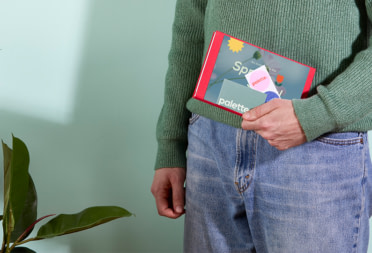How we MAKE IT: Stress Awareness Month
Four MOOsters tell us how they manage under pressure.

We’re all aware of stress as a thing, but did you know that April is Stress Awareness Month? Since 1992, it’s been raising awareness of the causes and cures of emotional tension. It’s also a chance to start a conversation about the impact it has on mental health, and how we can deal with it better (and even reassess terms like “deal with it”). So we asked four MOOsters to share their experiences of that dreaded feeling.
Arnold Boros, People Coordinator
“I’ve been using several strategies to reduce my stress. Physical activity has been one of my favorites to unwind and destress. For example, going to the gym after work helps clear my mind, release tension and improve my mood.
Recently I’ve started learning more about cognitive behavioural therapy, which has been proven to be an excellent way to reframe my thought process and approach things I find challenging or stressful.

Having a space to talk and share feelings is essential. It can help create a sense of community and support for people who may be going through similar experiences. Particularly [for people] who may feel isolated or alone in their struggles.
As HR professionals, it’s our responsibility to create a supportive work environment and culture that values open communication and emotional well-being. Providing a space for employees to share their feelings can help identify potential issues and concerns early on”.
Roxy Osario, Office Assistant
“I’m a very optimistic person who loves to smile. So I can easily recognize when stress is creeping on me. I start to isolate myself, and I don’t talk much.
“If it’s beyond your control, stop worrying and just move on.”
One major rule I follow, which relieves me of so much stress, is: “If it’s beyond your control, stop worrying and just move on.” If there’s nothing you can do at that moment, why stress yourself out worrying about something you can’t change? Just move forward. Worrying turns into anxiety, which can turn into a dark hole. I’d rather just look at whatever situation I’m in and accept it for what it is.
When I’m stressed, I close my eyes and lay down for 5–10 minutes. I use this to recenter myself, thinking of nothing but my breathing. This slows down time.
Long-term, I go to the gym regularly, and I always leave feeling great. I also get this feeling of gratefulness afterwards, like “wow!”. Exercise is “you” time, and it’s a great place to decompress”.
Helen Daglish, Social Media Manager
“In the past, I’ve struggled to identify when I was stressed, which made it much worse. But now I understand it more, it causes me to become irritable, unable to make decisions and creates that horrible feeling of impending doom! (Very dramatic). But overall, I can manage it better these days.

[For me] exercise is such a great outlet for de-stressing. Running has become therapy, and is a great way to distract your mind and refresh. Karate training is also great. Apart from getting to hit things, [it’s] my form of mindfulness in a weird way.
But I know exercise can be a big struggle, especially when you’re stressed. You really need to dig deep to find the motivation. But all the times I’ve dreaded exercising, I’ve NEVER regretted it after”.
Jenny Morgan, Customer Service Supervisor
“I’m quite good at hiding when I’m stressed because I’m generally quite outgoing. The first sign can be a heat rash on my chest, and I feel my heartbeat increasing. If it’s long-term stress, I stop sleeping properly. When I’m dwelling on something, I tend to not be able to switch off at night. I’ll just lie there in bed, going over everything I should have done and said.
I try to have a solid wind-down bedtime routine to help me destress after a long day. I’m a big fan of a calming candle and some relaxing music. The main thing is cutting down on my screen time. I might read or wash the dishes or just chat with my sister to wind down.
I like to get out of the house on my lunch break and take a walk (to see how many dogs I can meet). Working from home can sometimes mean I don’t leave the house for days, so I need to make a mental note to go outside.

At work I always make sure there’s time in my meetings for the team to tell me how they’re feeling. Feeling like you’re being heard is so valuable”.
Thanks to our mental health ambassadors, events and continuous efforts from our People and JEDI (Justice, Equity, Diversity and Inclusion) teams, every day we’re getting better at fighting the taboo around mental health at work. We even have a Slack channel where everyone can share resources to improve our wellbeing.
Want to learn more about how we support mental health at work? Connect with us on LinkedIn and check out our open roles to meet (or join) the MOO team.
Keep in touch
Get design inspiration, business tips and special offers straight to your inbox with our MOOsletter, out every two weeks.







